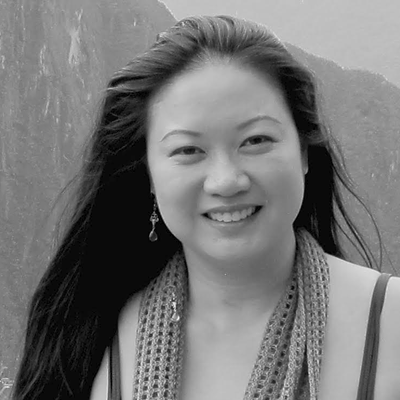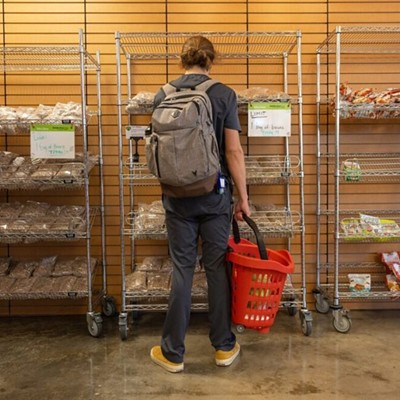This is the second part of a three-part Chef Chat series. You can read Part 1 here and part 3 Friday.
Yesterday, we chatted with Jean-Philippe Gaston of Cove Cold Bar about his earlier days at home with his family, his travels, and how he had to start from the bottom. Today we continue the conversation.
EOW: How did you get from Barry's Pizza to where you are today?
JPG: I worked my way up at Barry's Pizza, becoming manager, but they closed a couple of shops, and then I just started waiting tables at high-end restaurants, like Dennis Seafood. My cousin worked at the Omni and told me about Noe. I asked her, "Can you get me a job," but she said, "I'm going to try, but there are stages from all over here," so she got me an interim job as a room-service attendant. This turned into working the overnight shift, so I worked there all day until a spot finally opened at Noe. I jumped in and started at the bottom as a prep cook.
EOW: What does a prep cook do at a hotel?
JPG: There was like six, seven guys per station at that hotel. From peeling potatoes to cutting onions to fileting fish to cutting fruit. But then when I started seeing the light, that's when [Robert] Gadsby cut his contract and left.
EOW: So Robert Gadsby was there?
JPG: At that point in time, you had Randy Rucker working there, me, the guys from Artisans, Johnny Wesley from Killen's, Teddy Lopez from Killen's, Mike Potowski from Benjy's. And then there were a bunch of kids there from New York City. So when Gadsby terminated his contract with the Omni to go and open Soma, I became the sous chef for the Omni. Eventually, it was me and Johnny [Wesley], who was 18, and Cyrus (who's at Kata right now), who was 17, and I was like 24, 25.
EOW: This is a great history of what happened at that time!
JPG: Johnny and I kept in touch with Gadsby, who was our hero, until one day he called us and said, "Hey, why don't you come by Soma; I just opened it. You guys still have your apron and your spoons, right?" Because the way we gained ranks at Noe, it was Japanese style. If you earned a certain level, you got certain things. First, you got your 16-10 spoon, a regular hotel spoon, then you got your slotted spoon, your kunz spoon, and then your big kunz spoon, and then you got your apron, and if you got your apron and your three spoons, you were elite, a ninja.
I started working the morning shift at Soma; we left the hotel. And then I was only interested in what was happening at night, because that's when Gadsby would come in and do his tastings. So I would clock out after my shift, and then stay there until 10 o'clock at night every day, just to learn from the chef.
EOW: So let's forward to the present. Cove seemed to come out of nowhere. You guys opened in November, right before winter, which is kind of crazy for a raw bar. Tell me how it came about. I'm assuming it was your idea.
JPG: No, for the most part it was me and Randy's [Evans] idea.
EOW: What was wrong with the bar before?
JPG: The bar was a third of the size of the building. And it was just so dark, and people just weren't coming in for a drink. We had the best bartenders in the country -- Bobby Heugel designed it and Justin Burrows ran it -- so it wasn't the lack of good drinks; it was just the fact that people weren't attracted to it. We'd talked about stuff after a year and a half of being together, and I said, "I just don't understand the fact that we're Houston, we're coastal and no one in Houston has a raw bar," and we started off of that.
EOW: Did you model it after another restaurant somewhere?
JPG: The idea came about between me and Randy, and how in New York, everyone has a raw bar, but in Houston, no one has one. So he says, "Wouldn't it be cool if we did that? And you can take over the menu, and you can be the guy that does it." A huge compliment for me. And at the time, I already had in mind what I wanted my concept to be over the years, and a lot of it was stuff like this. So to me, writing the menu wasn't tough at all. Then Randy went to New York and did the homework on raw bars, and went to all these really good restaurants like Marea, and he noticed the raw bars were all circa 1994 raw bars -- cooked seafood served cold.
I started working on stuff that I'd lived in or worked at, or stuff that I'd always known existed -- Japanese and Indonesian dishes. And then I did a whole corner of the world, and then I still I had to write about ceviches and the Latin ones I knew about, and then I knew a few Italian and French ones, too. So then I thought, "Why don't I do a map of the world?" It evolved from there and turned it into regions of the world. So I started doing extensive research. "What is in the North Atlantic; what is in the South Pacific?" And the next thing you know, I have 200 recipes, from Iceland to South Africa.
EOW: What's on your menu, how many dishes on your menu now?
JPG: About 30.
EOW: Some of that is driven by seasonality, right?
JPG: It's more fresh than seasonal. It's more based on the availability of the fish. The whole point is to be outside of what Haven does. Haven is all local, super-seasonal; we only work with what nature gives us. But this is more everything from everywhere else, from Vermont and Pennsylvania to Japan and Gibraltar, Africa. It's whatever I can get three times a week. I call in orders so I have fresh fish on Monday, Wednesdays and Fridays. That's another thing, working in Japanese restaurants, the "Don't eat sushi on a Monday kind of thing." I'm trying to show people that I can get fresh fish from Hawaii that was swimming 24 hours ago and put on your plate the freshest quality possible.
Check back with us tomorrow as we taste some of Gaston's food.






